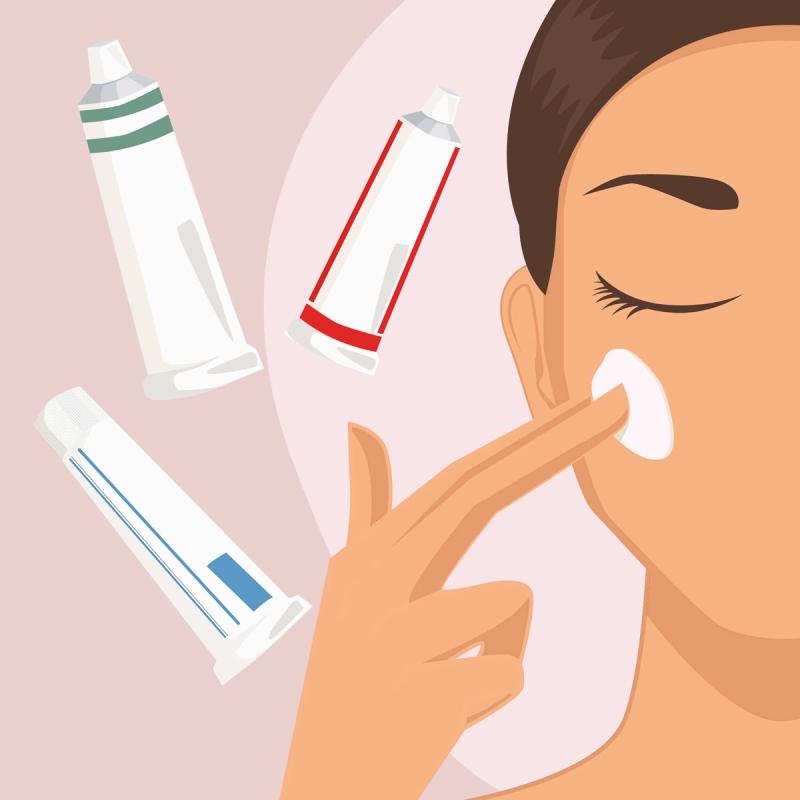Skin care terminology can be confusing with all the similar sounding terms like retinoid, retinol and tretinoin. How do you understand the differences, and how do you know which one is best for you?
Retinoid is an umbrella term that encompasses vitamin A-derived skin treatments, including retinol and tretinoin.1
Some retinoids have been clinically proven to treat acne and reduce signs of aging. While other retinoids may still need further research to prove their effectiveness. Learn all about the definitions, efficacy and side effects of different retinoid products to identify what aligns with your skin care goals.
Key Takeaways
Retinoid is an umbrella term for vitamin A‑based skin treatments that accelerate cell renewal and stimulate new collagen. It includes both prescription and over‑the‑counter products.
Retinol is an over‑the‑counter retinoid that is less potent and gentler than prescription versions. It is often used as a starter product, but there are no large clinical studies confirming its anti‑aging results.
Tretinoin (Retin‑A®) is a prescription‑only retinoid that delivers faster results for fine lines, discoloration and acne. Benefits often show in about 12 weeks, but a slow introduction is essential to limit dryness and peeling.
Choose tretinoin if you want the strongest, most proven results and are comfortable easing into use. Choose retinol if you have sensitive skin or prefer a milder starting point before moving up to prescription strength.
What is a retinoid?
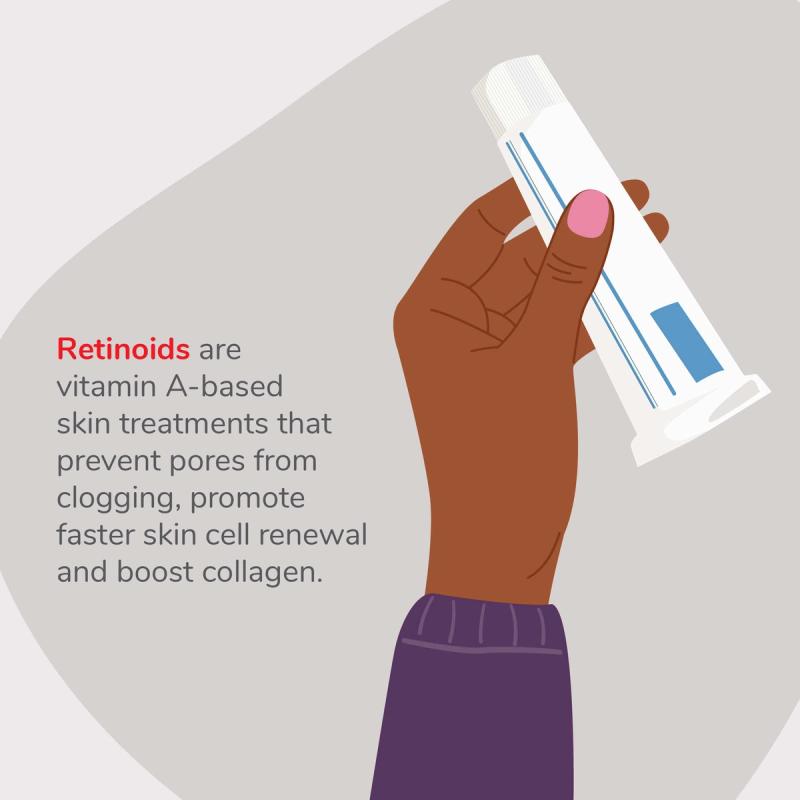
Retinoids are vitamin A-based skin treatments that prevent pores from clogging, promote faster skin cell renewal and boost collagen. The first retinoid, tretinoin, was approved by the U.S. Food and Drug Administration in 1971 as an acne treatment. Through use, doctors and patients observed that retinoids also helped with signs of aging like fine lines, wrinkles and skin tone.
Retinoids come in multiple formulations today, including tretinoin, adapalene and retinol.2
What is retinol?
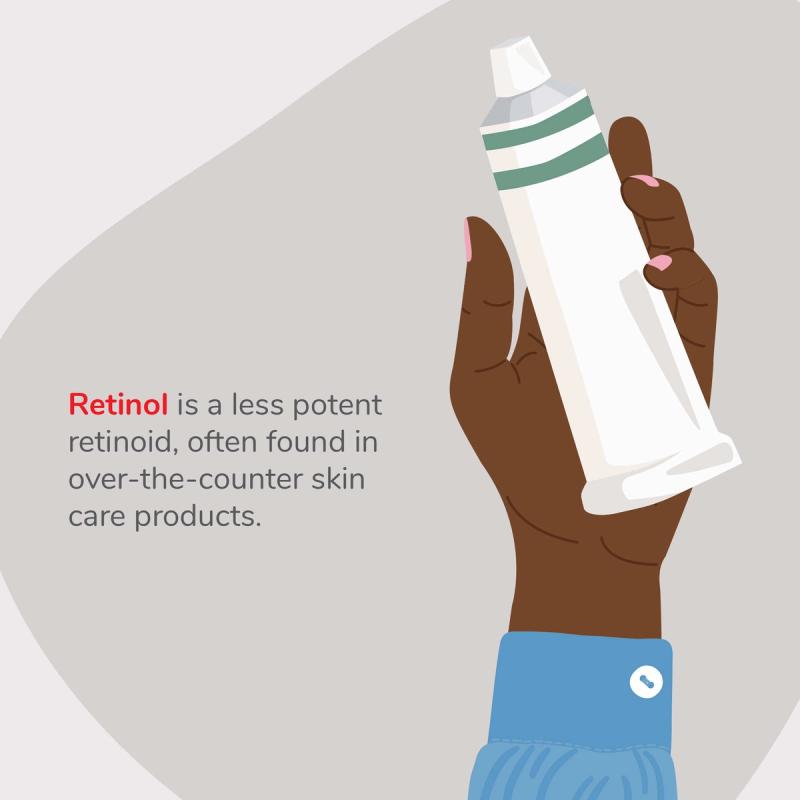
Retinol is a less potent retinoid, often found in over-the-counter skin care products.3 It works by speeding up the skin cell renewal process, keeping pores unclogged and boosting collagen. Retinol is used as a topical treatment for acne and signs of aging. It comes primarily in strengths of 0.25%, 0.3%, 0.5% and 1%4 in formulas.5
Cream.
Gel.
Lotion.
Ointment.
Serum.
Over-the-counter retinol products are not FDA-approved and are considered cosmetics, not medical skin care. In an overview of clinical trials of retinol products, there was no significant or reliable evidence that retinol-containing products improve the appearance of skin.6
What is tretinoin (Retin-A®)?
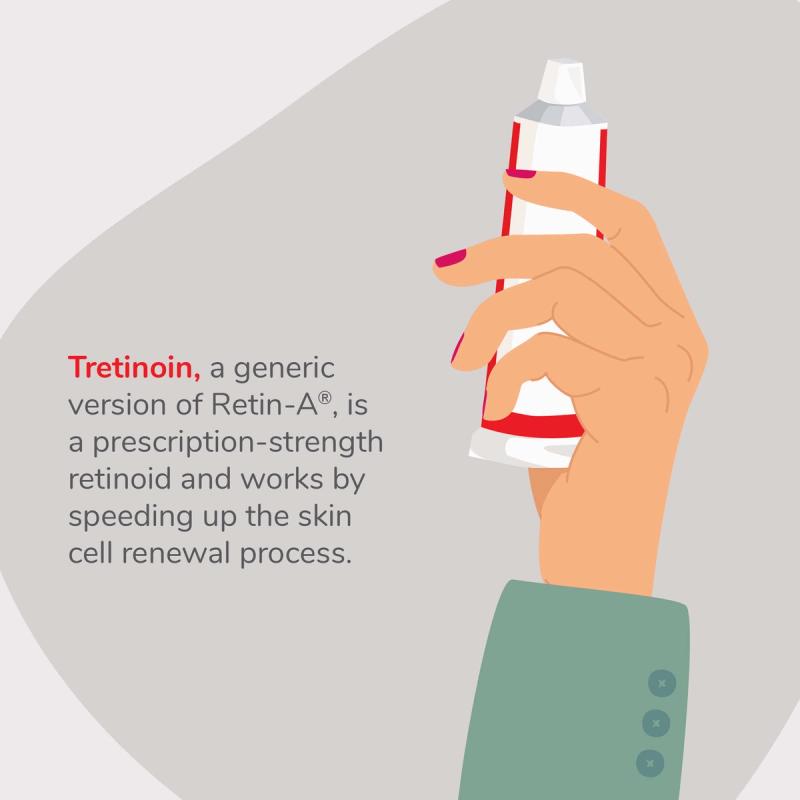
Tretinoin, a generic version of Retin-A®, is a prescription-strength retinoid that speeds up the skin cell renewal process. It is designed to treat acne and signs of aging like fine lines, wrinkles and discoloration.7 Tretinoin is available by prescription only and comes in four main forms:8
Lotion in 0.05% strength.
Solution in 0.05% strength.9
Tretinoin is an FDA-approved skin care treatment with over 40 years of use.10 FDA regulations mean that every prescription tretinoin product has the same ingredients except for the strength of retinoids.11
What are the differences between tretinoin, retinol and retinoid?
Retinoid is the umbrella term for vitamin-A derivatives that are used to improve the texture and appearance of skin. Retinol and tretinoin are both retinoids with different strengths. Retinol is gentler and available in over-the-counter products.
Tretinoin is stronger and available by prescription only. Generally, you will see results quicker with tretinoin than with retinol products. However, you may experience more side effects with tretinoin.12
How effective are retinol and tretinoin for acne, wrinkles and anti-aging?
Tretinoin has been clinically proven to significantly reduce signs of photoaging and chronological aging, and to boost collagen production.13 To date, there is a lack of clinical research to show retinol's effectiveness in reducing signs of aging.14
For acne, tretinoin (0.1%) was shown in studies to reduce acne blemishes by 80% in participants.15 Evidence for all topical retinoids as an acne treatment are strong;16 however, over-the-counter retinol products may need more viable clinical research for acne.17
Can retinol and tretinoin be used together?
Retinol and tretinoin are both retinoids. It is recommended to use only one retinoid product at a time to avoid irritation or other adverse effects.18
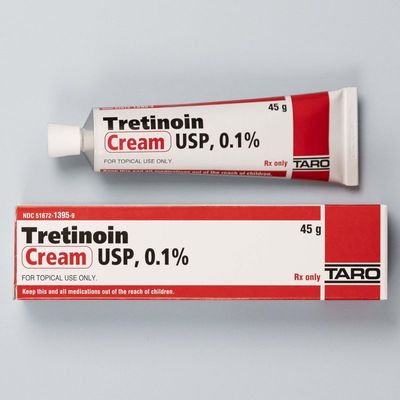
Tretinoin cream for a fraction of the price.
Clinically proven for fine lines and wrinkles. Get tretinoin cream online for $20 per month with a $25 consult.
Get StartedWhat are the side effects of retinol and tretinoin?
The side effects of retinol are generally temporary and include:19
Dry skin.
Itchy or irritated skin.
Redness and peeling.
Sensitivity to sun and sunburn.
Side effects of tretinoin are similar to retinol and include:20
Redness of the skin.
Burning, itching or stinging.
Chapping or slight peeling of the skin.
Darkening or lightening of skin color.
Unusual skin dryness or warmness.
Are retinol and tretinoin available over the counter?
Retinol is available over the counter. Tretinoin is available by prescription only.21
How do costs compare for retinol and tretinoin?
The cost of retinol products can vary widely from approximately $1022 to well over $100.23 Here are some over-the-counter retinols that dermatologists recommend at each price point:24
Budget: Neutrogena Rapid Wrinkle Repair – $27.99
Mid-Price: Kiehl’s Micro-Dose Anti-Aging Retinol Serum– $65
Splurge: Tata Harper Retinoic Nutrient Face Oil– $165
Surprisingly, prescription tretinoin can be cheaper than many over-the-counter retinol brands. The chart below compares different provider prices for prescription tretinoin.
Compare Tretinoin Cream Prescription Prices
| Brand | Cost |
|---|---|
RedBox Rx |
$20/month billed as $60/3 months |
Hers® |
$29/month |
WISP |
$25/month billed as $75/3 months |
NURX |
$30/month billed as $90/3 months + $30 consultation fee |
Agency |
$40-$65/month |
Apostrophe |
$25/month billed as $75/3 months |
Tretinoin (Retin-A®) vs. Retinol Comparison Chart
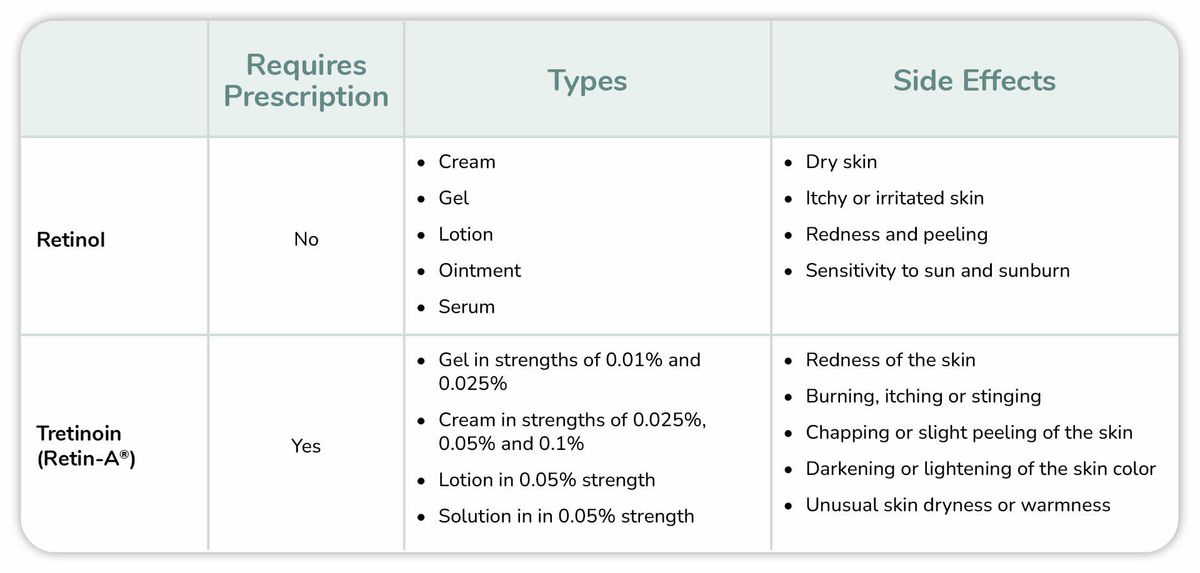
How RedBox Rx can help
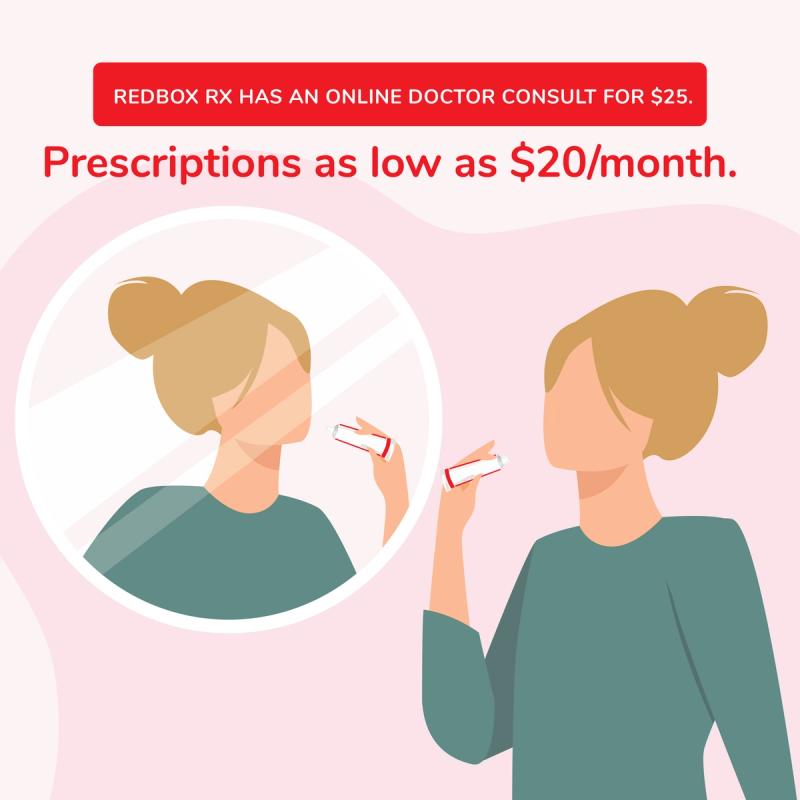
RedBox Rx makes receiving topical retinoids, such as tretinoin cream or tretinoin gel, for acne or signs of aging easy and affordable.
Benefits of RedBox Rx include:
Transparent, affordable, flat rates for medications starting at $20/month.
$25 consultation with a U.S. licensed medical professional.
No insurance required. FSA and HSA eligible.
No office wait times or scheduling issues typical with physical medical practices.
FREE shipping directly to you. One-time, monthly and quarterly subscriptions available.
Get started on your journey toward better skin with our online assessment for acne or anti-aging.

